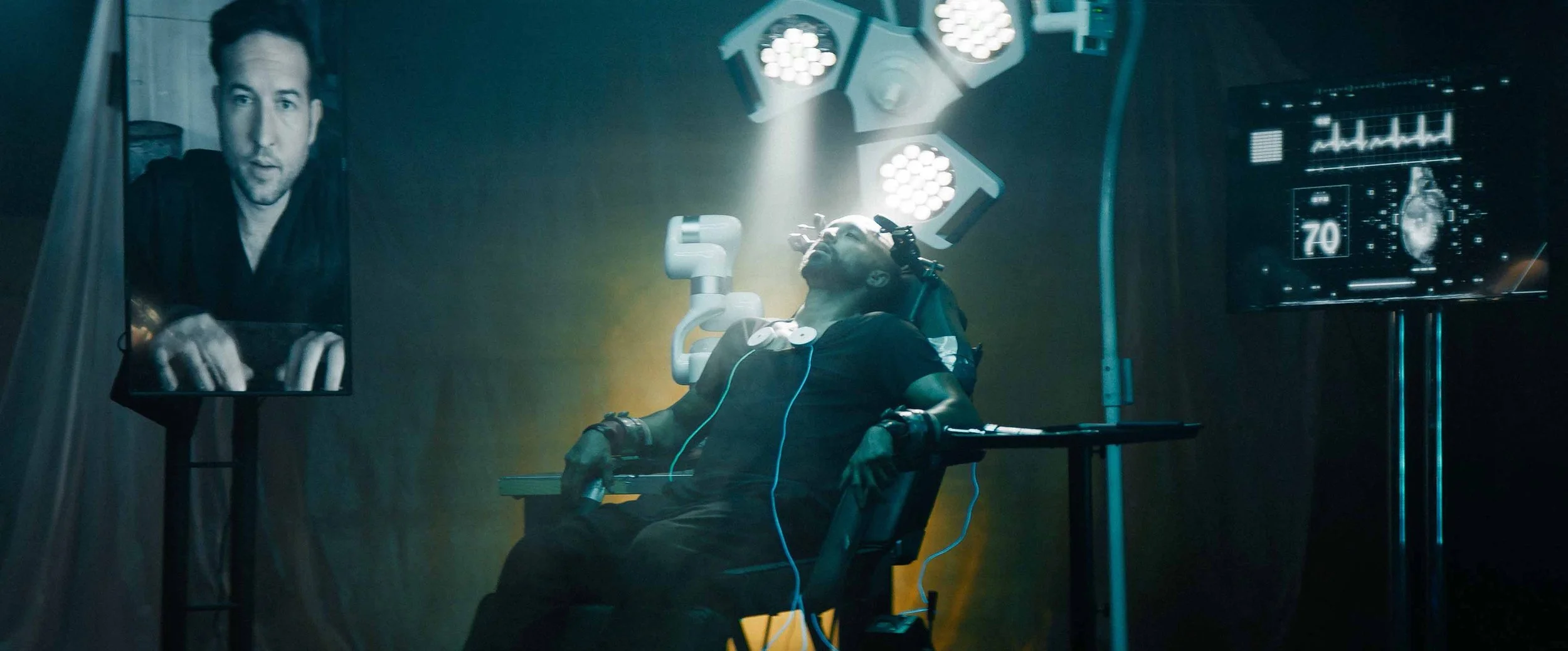Gala Film Launches Flagship Streaming Series RZR In New Era of Web3 Content
Creator and star David Bianchi provides an inside look at television’s potential on-chain future

For over fifteen years, independent filmmaker David Bianchi waited tables and worked as a bartender in between copious amounts of guest star work. The classically trained actor from Arizona State University would then put his restaurant earnings back into his own projects, leading up to his immersion in blockchain.
Inspired by Beeple’s $69 million Christie’s sale, Bianchi minted the first ever spoken word film as a nonfungible token (NFT) in March of 2021.
“I was arguably the first person to mint short films as ERC-721 tokens,” Bianchi said to me in a recent interview. “Ironically the same team that purchased the Beeple was the same team that acquired my genesis piece, I Can’t Breathe.”
Bianchi donated all of the proceeds to the George Floyd Memorial Foundation and quickly became one of the more sought after, socially conscious multimedia NFT artists in the game—with curations at Art Basel and being voted NFT 100 by NFT Now.
“For the first time in my entire history as a filmmaker and artist, web3 and the NFT space heralded me as ‘David Bianchi,’ he said. “It wasn’t just the ‘independent filmmaker’ being programmed at mom and pop film festivals in Arkansas with 20 other filmmakers at 5pm on a Sunday. People acknowledged ‘David Bianchi’ as the artist and there was a different sort of prestige that as an artist, I hadn’t been used to.”
Bianchi quickly became a thought leader for independent film and blockchain technology, which paved the way for meeting the Gala team at VEECON, where at the time—and unbeknownst to him—Gala was building the granular components of what would become Gala Film.
Through a series of conversations, Bianchi became the first partner to join Gala Film, creating, producing and starring in its first ever streaming series—the recently debuted RZR—a sci-fi thriller that immerses viewers in a dystopian world filled with implants, artificial intelligence, and the shadowy depths of black-market crime. In addition to Bianchi, the series stars Mena Suvari, Emilio Rivera, Richard Cabral and Danny Trejo.
A scene from RZR
But before RZR could even come to fruition, Bianchi had to figure out the building blocks to a compelling narrative that would live as on-chain content—combining blockchain and storytelling in a way we really haven’t seen.
“I knew there were going to be budgetary limits and I didn’t see a world where Gala was going to fund 240 minutes of high level content—the equivalent of eight episodes at 30 minutes,” Bianchi said.
He opted for eight episodes at 15 minutes, believing it would appeal to the web3 demographic, which has notoriously shorter attention spans. Also influencing episodic length was Bianchi’s awareness of the prime time category for Outstanding Short Form Drama or Comedy.
“I was like, ‘Let’s go win a f--ing Emmy,’” he said. “Let’s take web3 to the Television Academy. That was always in my architecture. While we were scripting this thing, we were also crafting an NFT drop of conceptual works.”
Production on RZR then moved at the speed of web3. In less than six months, Bianchi and his team were able to assemble the development and physical production requirements to launch their web3 television project.
“We always knew this was something that was going to run on a system of nodes,” Bianchi said. “Nodes were earning POPCORN! even before the platform was released.”
The POPCORN! is part of Gala’s tokenized ecosystem, whereby screen node operators receive rewards in the form of POPCORN! Buckets—essentially mint allowances for the creation of $FILM once the token is initially allocated. For every POPCORN! Bucket, holders will receive 10 $FILM.
Explore films made by and in partnership with Decential Media: The Big Empty
It’s all part of Gala Film’s monetization plan, which in combination with Mystery Boxes—a random assortment of digital collectibles, NFTs (called shards) and experiences specific to RZR—provides a foundation from which Gala can build and iterate.
“Ten years ago, reward-based entertainment didn’t exist in gaming and now it’s the dominant model, generating 75 percent of the industry’s revenue,” Chris Hutchinson, producer at Gala Film, said to me over email. “In the conservative scenario, we are a great alternative to the traditional streamers, valuing the strength of fans rather than the number of viewers. In my wildest speculation, this is potentially a revolution in visual content that could put creators and fans back in control of what gets made rather than suits and spreadsheets.”
If the ploy was to shake up the studio system, it’s a ploy Bianchi felt was loaded with pressure. With RZR, he felt he was carrying not only the weight of Gala and living up to his own name as an artist on his shoulders, but was also carrying the weight of web3 with the first ever television series produced by a web3 company.
“Web3 tech is great, blockchain tech is great,” Bianchi said. “But at the end of the day with this type of content, you’re selling the sizzle not the steak. If the show isn’t bad ass, no one will give a f-k about the NFT. Why do you buy a lightsaber? Because you fall in love with Star Wars. If Star Wars sucks, you’re not buying the Jabba The Hutt toy. We needed to create something that would prove to the studio system that there are voices and artists inside of web3 that are actually worth looking at and investing in. If not, we’re just a bunch of weirdos making ‘blockchain cinema.’”
Whether Bianchi and his team hit the mark remains to be seen. The platform has only been in existence for about a month and the RZR team has yet to make a strong UA push with the backend tech still being worked on.
“If the Mystery Box proposition doesn’t work then ultimately the financial model fails,” Bianchi said. “If it’s not easy to open and use it, people are going to give up and walk away.”
Given the small size of the web3 community, it’s imperative the gamified financial model makes sense to the general audience for it to have lasting success.
A scene from RZR
“Every [intellectual property] owner is trying to figure out how to better engage, amplify and monetize their fan community,” Justin Hochberg, CEO of Virtual Brand Group, said to me over email. “Five percent of additional customer loyalty translates to a 20 percent better bottom line. The savviest IP owners that the Virtual Brand Group works with think of fan bases in concentric circles: On the outer ring are casual fans who want a passive experience, but in the bullseye are fans willing to take actions and stay engaged on a daily basis.”
So if the RZR user experience is clunky, there’s a severe chance of losing people. Though, according to Bianchi, the web3 community loves it.
“After the first two episodes dropped, I was in the Discord waiting for people to talk about the show, but everyone was talking about trading shards,” Bianchi laughed. “Everyone was trying to assemble their scenes instead of talking about the show, proving the gamification element really works.”
At least for the people who know how it works.
“If this is a micro of the macro, we’re onto something, provided we can streamline it for web2 audiences to jump in, work with it, and not have to think about web3 or cryptocurrency,” Bianchi said.
Consistent with other parts of web3 at the moment, the mission for RZR is to utilize blockchain technology as part of its backend process without promoting that element of its infrastructure to the general population.
“The great thing about our platform is you can just invite people to watch the content,” Hutchinson said. “You don’t need to explain NFTs, which present one of the biggest growth opportunities we’ve ever seen in the web market.”
Bianchi wants to give people a compelling television show that just so happens to utilize blockchain technology behind the scenes.
“Cinema as an artform is designed to be seen by as many people as possible, which is why token-gating it is a dumb move,” Bianchi said. “As a standalone art piece, RZR does its job with or without web3.”
lead image: Christopher Marquette (l) and David Bianchi


